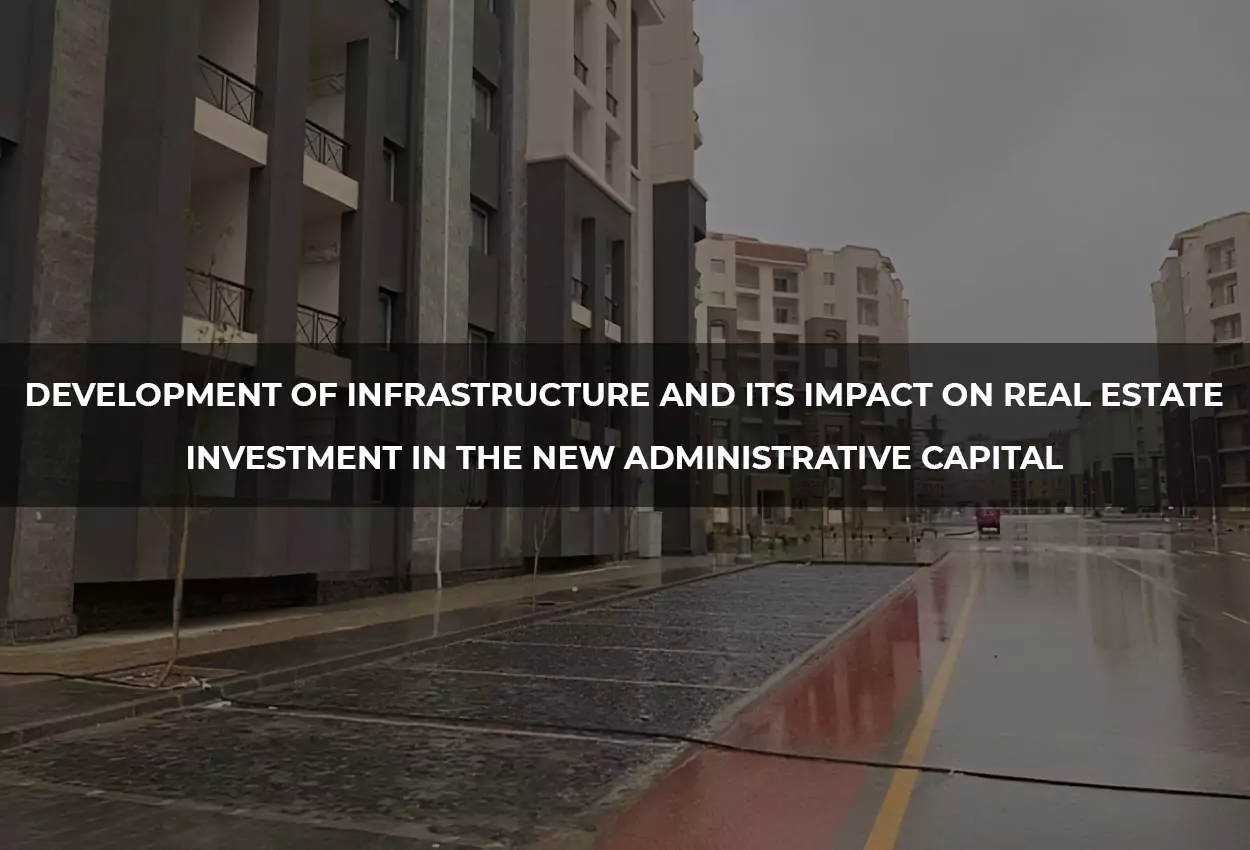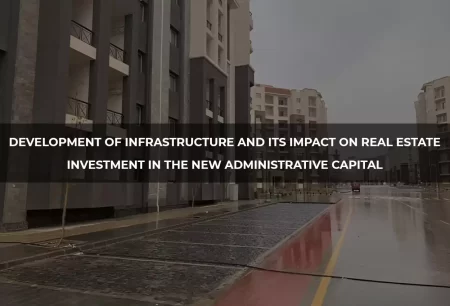The New Administrative Capital in Egypt is a massive project aimed at achieving sustainable urban growth and developing modern infrastructure. This extensive development has significant effects on real estate investment in the region. Improving the infrastructure in the New Administrative Capital is a crucial factor in attracting investors and enhancing economic growth in the area.
Infrastructure works to provide the essential framework that supports daily life and economic activities in any region. In the case of the New Administrative Capital, development involves creating main roads, public transportation networks, public facilities, schools, hospitals, commercial centers, and recreational areas. This infrastructure development allows investors and residents to benefit from a modern, integrated, and comfortable living and working environment. One of the key impacts of infrastructure development in the New Administrative Capital is attracting more real estate investments. Real estate investment in the region is seen as an opportunity for investors to capitalize on rapid urban growth and expected economic expansion in the future. With the availability of modern infrastructure and comprehensive facilities, investors can develop various real estate projects such as hotels, commercial offices, shopping centers, and residential units. Thanks to advanced infrastructure, good investment returns can be realized, and the value of properties in the area can increase.
Additionally, improving the infrastructure in the New Administrative Capital enhances the attractiveness of the area for large and international companies and institutions. The advanced infrastructure and integrated services provide an ideal environment for establishing corporate headquarters and business centers. With numerous government and administrative facilities in the New Administrative Capital, the area becomes an ideal location for companies and institutions looking to expand their operations in Egypt and the Arab region.
The benefits of infrastructure development in the New Administrative Capital are accompanied by other positive effects. Continuous improvement of infrastructure raises the living standards for residents and enhances the public services available to them. It also contributes to creating new job opportunities and developing economic sectors related to infrastructure, thereby promoting economic growth and working towards sustainable development in the region.
Infrastructure development in the New Administrative Capital represents a crucial factor in attracting real estate investments and promoting economic growth. We provide advanced infrastructure for a modern and integrated living and working environment, enhancing the region's appeal for real estate investments and large corporations. Additionally, it contributes to improving the quality of life for residents and creating new employment opportunities, fostering sustainable development and prosperity in the New Administrative Capital.
The Importance of Infrastructure Development in the New Administrative Capital:
Infrastructure development in the New Administrative Capital in Egypt holds significant importance for economic growth and sustainable development in the region. Here are some key aspects highlighting the importance of infrastructure development:
- Attracting Investments: Advanced and integrated infrastructure plays a crucial role in attracting both national and foreign investments. With well-established infrastructure, the New Administrative Capital becomes an enticing destination for investors looking to invest their capital in sustainable real estate and business projects. Increased investments contribute to economic growth and provide new employment opportunities for the residents.
- Improving Quality of Life: Infrastructure development contributes to enhancing the quality of life for the residents in the New Administrative Capital. Modern infrastructure and integrated public facilities better cater to the residents' needs in areas such as transportation, education, healthcare, entertainment, and public services. This enables residents to enjoy a comfortable life with sophisticated amenities, promoting their well-being and overall happiness.
- Urban Development Enhancement: Infrastructure development works to enhance urban development in the New Administrative Capital, transforming it into a modern and advanced urban center. This includes the creation of main roads, public transportation networks, public facilities, residential and commercial areas, and green spaces. Advanced urban development improves the quality of life and provides diverse economic and social opportunities for both residents and investors.
- Environmental Sustainability: Infrastructure development in the New Administrative Capital is linked to environmental sustainability. By focusing on the use of modern and advanced technologies in designing and building infrastructure, a balance between urban development and environmental protection can be achieved. This involves utilizing renewable energy resources, providing sustainable transportation systems, efficient water management, and waste recycling. Environmental sustainability helps preserve natural resources, reduce negative environmental impacts, and, consequently, enhances the quality of life for current and future generations.
- Promoting Social Integration: Infrastructure development contributes to promoting social integration in the New Administrative Capital. When there are efficient and accessible transportation networks, and public facilities are available in various neighborhoods, social interactions, cultural diversity, and economic cooperation are enhanced. This works to strengthen bonds among residents, foster community belonging, and encourage collaboration.
In conclusion, the development of infrastructure in the New Administrative Capital contributes to achieving sustainable development and improving the quality of life for its residents. It is a necessary investment in building an advanced and sustainable community that meets the needs of both current and future generations.
How Infrastructure Development in the New Administrative Capital Affects Real Estate Investment:
The development of infrastructure in the New Administrative Capital significantly impacts real estate investment in the region. Here are some key effects:
- Increased Real Estate Attractiveness: Advanced infrastructure development contributes to enhancing the real estate attractiveness of the New Administrative Capital. When convenient transportation, integrated public facilities, and good essential services are available, the location becomes more appealing to real estate investors. Investors seek to invest in properties that provide an integrated and comfortable environment for residents, coupled with employment opportunities and diverse services.
- Increased Property Values: Infrastructure development leads to an increase in property values in the New Administrative Capital. Property prices in areas experiencing infrastructure development typically rise, as investors anticipate improved demand and heightened interest in these locations. This means that early property investors can achieve favorable returns when property values increase in the future.
- Diverse Investment Opportunities: Infrastructure development in the New Administrative Capital promotes a variety of investment opportunities in the real estate sector. Residential, commercial, office, entertainment, tourism, and other projects are initiated, offering wide-ranging options for investors to diversify their investment portfolios. This enhances economic dynamics and attracts more investments to the region.
- Increased Demand for Real Estate: Well-executed infrastructure development boosts demand for real estate in the New Administrative Capital. Integrated infrastructure and public facilities attract residents and investors, leading to an upsurge in real estate demand in the area. Consequently, property prices may rise, yielding higher returns for property owners.
The development of infrastructure in the New Administrative Capital enhances real estate investments in the region, contributing to increased property values and providing diverse investment opportunities. The continued interest in the New Administrative Capital and the growth of investments are anticipated as infrastructure projects are completed, and additional services and facilities are provided for residents and investors.
The Benefits for Residents and Investors from Infrastructure Development in the New Administrative Capital:
Infrastructure development in the New Administrative Capital can offer numerous benefits to both residents and investors. Here are some potential advantages:
- Improved Quality of Life: Infrastructure development can lead to an enhanced quality of life for residents. Improvements in access to basic services such as water, sanitation, electricity, and public transportation can contribute to a higher standard of living. Additionally, proximity to employment opportunities, education, and healthcare facilities can further elevate the quality of life.
- Job Opportunities: Infrastructure development can create new job opportunities. The construction of large-scale projects requires a multitude of workers and technicians during the development phase. Once completed, the new facilities can act as a magnet for companies and new businesses, generating more employment opportunities for residents.
- Increased Investments: The development of new infrastructure can attract national and international investors and companies to the New Administrative Capital. Enhanced facilities and modern infrastructure provide a conducive environment for investment, opening up new business opportunities and fostering economic growth.
- Improved Transportation and Communication: Infrastructure development implies improvements in transportation and communication in the New Administrative Capital. A sophisticated and efficient public transportation network, including trains, buses, and metro services, can be established. Additionally, enhancing digital infrastructure and providing high-speed communication services and smart systems facilitate seamless communication and access to information.
- Development of Surrounding Areas: Infrastructure development in the New Administrative Capital can lead to the development of surrounding areas. Economic and commercial activities may spread to adjacent regions, promoting sustainable development and providing economic and social opportunities for local communities.
Challenges Facing Infrastructure Development in the New Administrative Capital:
- Financing: Financing stands as one of the major challenges in infrastructure development. Implementing large-scale infrastructure projects in the New Administrative Capital requires substantial investments and significant financial resources. Securing these funds can be challenging, especially without sufficient agreement between the public and private sectors regarding project financing.
- Execution and Management: Infrastructure development necessitates effective project execution and management. Managing large projects, controlling schedules, costs, and ensuring work quality is a formidable task. Relevant authorities need expertise and competence in project and contract management, as well as coordination among various stakeholders to ensure the smooth and successful implementation of infrastructure projects.
- Urban Planning: Urban planning for the New Administrative Capital must be sustainable and tailored to meet the future needs of residents and investors. Urban growth should be directed wisely, ensuring the availability of necessary spaces for residential, commercial, service, and environmental projects. Balancing urban growth while preserving the environment and providing sustainable living and quality of life for residents may pose challenges.
- Coordination and Collaboration: Infrastructure development requires coordination and collaboration among various stakeholders, including the government, real estate developers, investors, and the local community. Clear agreements and effective collaboration must be achieved to accomplish urban development goals and overcome the diverse challenges.
Effectively managing these challenges requires good collaboration and coordination among involved parties, focusing on thorough planning and efficient project management. With diligence and commitment, it can be said that there are challenges facing infrastructure development in the New Administrative Capital, but with proper coordination and effective management, these challenges can be overcome, leading to sustainable and successful development in the region.
Steps to Overcome Challenges in Infrastructure Development in the New Administrative Capital:
To overcome the challenges facing infrastructure development in the New Administrative Capital, several measures and approaches can be followed:
- A comprehensive and integrated infrastructure plan must be developed, encompassing the analysis of current and future needs while prioritizing them. A long-term strategic vision for urban development and infrastructure improvement should be established, ensuring the availability of necessary funds and financial resources.
- Enhancing collaboration and partnerships between the public sector, private sector, international investors, and the local community is crucial. Strategic agreements and partnerships can be signed for the financing and implementation of infrastructure projects, as well as for the exchange of knowledge and expertise.
- Exploring and utilizing alternative financing methods for infrastructure projects, such as public-private partnerships, foreign direct investment, sustainable financing, and joint ventures, is recommended. Opportunities for funding from international financial institutions and regional organizations should also be explored.
- Technological innovations can be leveraged in the development of infrastructure for the new administrative capital. Smart technology can be employed in project management, schedule control, and cost reduction. Technology can also be used to enhance public transportation, energy management, and improve public services.
- Communication and transparency with all stakeholders, including citizens and the local community, should be enhanced. The public should be involved in the decision-making process, and the benefits and expected impacts of infrastructure projects should be clarified.
- Environmental sustainability must be a fundamental element in infrastructure development. Projects should be adapted to achieve resource efficiency and reduce negative environmental impacts.
Overcoming challenges related to infrastructure development in the New Administrative Capital requires joint efforts and collaboration among stakeholders. Through careful planning, collaboration, exploring alternative financing methods, utilizing technology and innovation, promoting transparency and community participation, and focusing on environmental sustainability, these challenges can be overcome, leading to successful infrastructure development in the New Administrative Capital.


